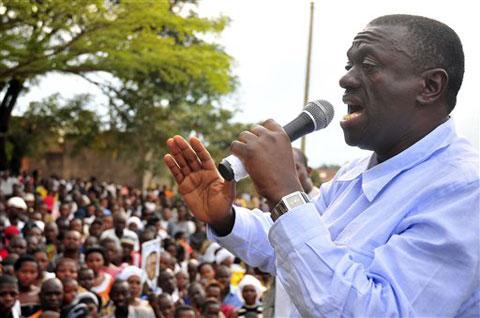Standing in last year’s election for the third time against President Yoweri Museveni, Kizza Besigye lost by a wide margin, although he maintained that intimidation and vote rigging had been used against him. Even so, the FDC still performed relatively well in parliament by winning 37 seats. Dr Besigye has led ‘walk-to-work’ protests against the high prices of food and fuel but he recently announced he would soon retire from the leadership of his party.

Global: For the last ten years you have tried different ways of unseating the government, including elections, the courts and most recently demonstrations like ‘walk-to-work’. But little has changed, and it looks like there is a stalemate in Uganda’s politics. What next for Uganda after this?
Dr Kizza Besigye: Ten years ago, it was inconceivable that ordinary people could stand up against the police and the army to defend their rights. But you have been seeing, incrementally, people challenging authority, saying [for example, that] you will not take over our markets, and fighting incessant wars to retain their markets until they won them. And once they win them, those small victories embolden them; they show them that, “yes, we have the power after all”. So it is incremental and it is happening.
Now you can see people challenging the government over Umeme [the national electricity distributor], saying we cannot continue without power [electricity]. And they come up and demonstrate and protest until power [electricity] is restored. If a road is causing them a lot of problems, they close it and say, “Nobody will pass through this road now until you make arrangements to fix it”. And it is done.
We are now at a level where, with a little more organisational ability, the people of Uganda will assert themselves conclusively and demand that the corrupt dictatorial regime gets off their backs.
It has been said that there is a need for you to sit down with President Museveni and ‘talk’. Do you see this as a possibility? What is your position on charting a solution to Uganda’s problems at the round table?
Yes, the round table is essential. We have been demanding it, but only for one purpose: to have a peaceful transfer of power from the dictatorship to the people of Uganda. That is the only purpose, the only objective, the only outcome that can be achieved through any process of dialogue. It is not to discuss, to share power, to have some cosmetic changes. No. The primary problem of our country is having power held by the guns rather than by the people. That must fundamentally change. And we can negotiate, therefore, the transition from Museveni and his dictatorship to a new dispensation where people have the power and it is not controlled by guns. That can be achieved through dialogue.
The opposition in Uganda has sometimes been accused of merely wanting to take over government without articulating in detail the things it would do when in power. At a time like this, when the government is grappling with an economic crisis, what would you want to change to improve the economy?
The high cost of public administration is one grey area that takes away from people’s [ability to] benefit from collective resources. The second thing is, of course, corruption, which drains huge amounts of resources. Some people think that it is impossible to deal with corruption, but it is certainly not. We have seen, even in our neighbourhood, countries that have tamed corruption. We believe that it takes political will, amongst other things.
But over and beyond what institutions can do, there must be a concerted effort at civic education so that people themselves demand and check the government directly through a free media [and] through the separation of powers so that parliament can exercise oversight. All these, however, need political will.
These are changes that would then free money to be allocated to the real priorities that we consider necessary for development. One is education. We must invest in relevant education. We need, of course, to deal with the health of our people. Without a healthy society you cannot talk about development. We also need to invest in agriculture, which is the backbone of our economy and will remain [so] for quite some time. [Agri]-industry must be the focus of adding value to what we produce.
If we release resources, they should be channelled into these areas that impact directly on the lives of the people. And we have a clear priority of doing that.
When the ‘walk-to-work’ protests started, in the wake of the Arab spring, there was a sense that the ripple effects of those North African revolutions would be felt in Uganda and other Sub-Saharan countries facing similar hardships. Why didn’t that wave sweep down south even after you tried to ignite it here?
The central dynamic is that you have a people who are marginalised, who are repressed, who increasingly become conscious of their situation, who increasingly become organised, and who increasingly challenge the status quo. The outcome of that challenge is normally different in different countries. We don’t know which direction it will take in our own country. It doesn’t have to take the same direction as it did in the Arab world but the core dynamics are the same.
Interviewed by Benon Herbert Oluka





